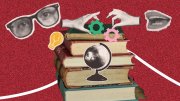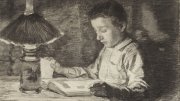Berta Greenwald Ledecky Undergraduate Fellow Spencer Lenfield ’12, who has been attending this year’s Norton Lectures by the Turkish novelist and Nobel laureate Orhan Pamuk, filed this report. (The final lectures, "Museums and Novels" and “The Center,” will be delivered on Monday, October 26, and Tuesday, November 3, at 4:00 p.m.)
Among the several hundred people waiting in line on September 22 for Sanders Theatre to open for the first of the 2009-2010 Charles Eliot Norton Lectures, all the talk was of the lecturer, Orhan Pamuk: "Have you read any of his books? Did you see his last short story in the New Yorker? What do you think he'll speak about?" Many of the people were from the Harvard community; many were not. One couple had driven all the way from Maine.
The Norton lectures, established in 1925 as part of a two-year professorship in poetry—"interpreted in the broadest sense, including, together with Verse, all poetic expression in Language, Music, or the Fine Arts"—have been delivered by some of the most remarkable men and women in arts and letters of the past century, including T. S. Eliot ’10, Litt.D. ’47, Robert Frost ’01, Litt.D. ’37, Igor Stravinsky, and Nadine Gordimer, Litt.D. ’86. The lectures were one of the things I looked forward to most about returning to school this fall, even though I didn't know who the lecturer would be. I was simply excited at the prospect of hearing someone of such high caliber speak, for six weeks, about literature and art. When I learned that Pamuk would be this year's Norton professor, I was excited again, this time because I knew who he was. Pamuk is best known for winning the 2006 Nobel Prize in literature, but I knew him because one of my high-school friends had recommended his novel My Name Is Red to me in senior year.
Sanders Theatre was full—truly full—for the first lecture (and though the crowd has eased a bit subsequently, it continues to fill the first floor and a good part of the balcony). I was struck to see so many professors and administrators seated in the front of the hall. It is unusual, and a bit humbling, to see one's teachers watching, rather than delivering, an academic lecture.
Pamuk has titled his lecture series "The Naïve and Sentimental Novelist," recalling Friedrich Schiller’s essay "On Naïve and Sentimental Poetry," According to Pamuk, Schiller distinguishes two types of poets: naïve poets, who write spontaneously, unknowingly, "as if dictated to by nature or God"; and sentimental poets, who are almost painfully aware of both the act of writing and the expressive limits of their own abilities. "Sentimental," Pamuk noted, is a bad translation of the German sentimentalische, which actually means something more like “reflective” or “pensive.” (Schiller called himself sentimentalisch and his rival, Goethe, "naïve.") "Being a novelist is the art of being both naïve and sentimental at the same time,” Pamuk said in his first lecture, “What Happens to Us as We Read Novels.” “In my own youth, I moved between naïveté and sentimentality. … but now, I have found equilibrium between the naïve and sentimental within me." In each subsequent lecture, he has continued to seek a reconciliation of the two qualities in the art of the novel.
Though he does refer to his own works and experiences, Pamuk has been using his lectures primarily to present a theory of the novel—an accounting of what we, as readers, do when we read a novel, and how a novel works on us: how it makes us feel, makes us think, keeps our attention from wandering. "The real measure of the novel must be its power to make us think, 'Yes, life is exactly like this,' " he said at the end of the first lecture. Earlier, he had remarked, "We are constantly searching for the 'secret center of the novel.' What is this center? We are somehow convinced it is far from the surface, and we chase it word by word. Because we assume there is a center, we are like the hunter, seeing each branch, nook, and footprint as an indication." He took a sip of water before adding, with a smile, "Novels lead to guilt, paranoia, and anxiety."
The audience laughed, of course, because novels do and they don't. They are also an escape from the everyday, and Pamuk has also talked repeatedly about "the joy of the novel." Novels, however, equip us with the tools to relate even the most distant, alien, or painful experiences to our own, and Pamuk talked at great length about the problem of shared experience and the imagination in his second lecture, "Mr. Pamuk, Did You Really Live All This?" Using examples from Defoe to Nabokov and himself (the range of literary references in every lecture is formidable), he argued that "the novel draws its power from the lack of a consensus between the author and the reader on the reality of the fiction." Readers, he suggested, have a corresponding desire to be both naïve and sentimental at the same time, and the novel is a "special structure that allows us to simultaneously believe in contradictory thoughts and characters," a "play of mirrors between writer and reader." But this "immense joy of reading and writing novels is bypassed by two types of readers," he warned. "First, completely naïve readers who always read everything as direct biographical experience. Second, completely sentimental, reflective critics, who always read texts as constructs. … I must warn you to keep away from such people, because they are completely immune from the joys of reading novels."
Pamuk has returned several times to a particular scene in Anna Karenina (part one, chapter 29), in which the heroine is returning from Moscow to St. Petersburg by train. She has brought an English novel and, faced with a dearth of stimulating conversation in the car, decides to start reading. Though she is distracted by the snowy countryside at first, the novel begins to pull her in: Tolstoy writes, "Anna read and understood, but it was distasteful to her to read, that is, to follow the reflection of other people's lives. She had too great a desire to live herself." She begins not only to feel the emotions but to participate in the actions of the characters in her book—and then, not only to feel their feelings, but to attribute her own to the characters, until the line between character and reader dissolves. "Anna Karenina is great because of the landscape she is part of, not she herself—she reminds the reader of the entire landscape, she becomes the landscape," Pamuk said at the third lecture last week. "The joy of the novel is not to drive the story through a character, but the moment when we feel a piece of what he feels."
And the power of novels, he contended, is such that the best among them can make us think, "Yes, life is exactly like this" even when they are at their least realistic. "People do not actually have as much character as characters in novels—especially nineteenth- and twentieth-century Western novels," he commented wryly in his third lecture, "Character, Time, Plot." There is something of an obsession with character in the art of the high novel—the idea that characters drive plot, and the demand placed upon them to be "real" and "living"—which Pamuk thinks is misplaced. It shows us no more than that some novelists do work from character. In Pamuk's opinion, the real challenge facing the novelist lies in using characters to actualize the plot. Speaking of his own experiences as a writer, he insisted, "I need my cast of characters to explore new things! The novel's personages are defined by the situation I want to explore." A character alone does not drive the plot of a novel, he argues. Rather, the novelist uses characters as tools to express the plot that he holds in his imagination. In the end, the mechanism of character is important because it is a lens that allows both writers and readers to understand each individual plot detail that the novel presents, and thus for the world of the novel to come alive. "It is only through entering the minute, subjective details of the novel that we can hope to understand it at all," he concluded.
Resuming the theme in the fourth lecture, "Pictures and Things," Pamuk stated, "The task of the novel is to imagine a world, which only later is put into words." "It is one of my strongest beliefs," he said, repeating the point for emphasis, "that novels are fundamentally visual literary fictions. …To read a novel is to visualize through others' words images in our minds' eyes… When I am writing a novel, there is always an image in my mind's eyes. I am aware that my first duty is to clarify and sharpen that image." He discussed how, growing up, he had always wanted to be a painter until, one day at the age of 23, he suddenly found that the joy of painting was gone, and he wanted instead "to paint with words." "By translating Tolstoy's words on the page into what Anna sees, we feel her emotions," he said, returning to the passage from Anna Karenina. Later, speaking of the richness of visual detail that surrounds Madame Vauquer in the opening of Balzac's Le Père Goriot, he noted that "We need all these details not just as parts of the place, but as part of the soul of Madame Vauquer.…Objects are both the indispensable moments of the novel and the symbols of that novel."
Students of literature, like me, are taught early on to distinguish between books, which are concrete, material objects, and texts, which are the immutable form of a literary work. When you read, it is the book that you hold in your hands, but the text that you read—despite the fact that the letters and pages are parts of the book, which is to say: they, too, are merely objects that then bring the text to life in the mind of the reader. I know that this isn't really what Orhan Pamuk meant when he talked about the role of objects and pictures within the novel. But I couldn't stop myself from thinking, as I looked over the novels on my bookshelf and started the one I had to read for class, that it might just be possible for a novel to become an indispensable part of a life—or even a symbol for that life. I smiled, and disregarded the thought as a bit naïve. Yet as I sat down and started reading, I realized that even my most jaded, sentimentalisch side agreed. It's silly to think that a single book could have all the answers. From what he's said so far, I don't think that Pamuk would say that the novelist even tries to have all the answers. It is entirely possible, however, that a certain book, mere object though it may be, can become indispensable to a certain person—not just part of a place, but part of a soul.









